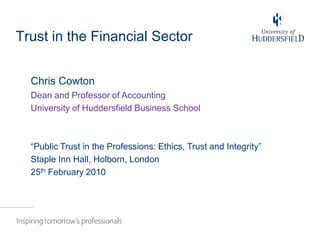
Trust in the Financial Sector
- 1. Trust in the Financial Sector Chris Cowton Dean and Professor of Accounting University of Huddersfield Business School “Public Trust in the Professions: Ethics, Trust and Integrity” Staple Inn Hall, Holborn, London 25th February 2010
- 3. On trust
- 4. Trust and the financial sector
- 5. Trust, the financial sector and professions
- 6. Conclusions: where does that leave us?
- 8. Trust and the financial sector Why does trust matter? One answer: because it’s been undermined by events Crisis of confidence banking crisis ( learning?) More fundamental issues; some around power and information asymmetries Technical nature and expertise (esp. B2C) Search, experience and credence attributes Importance of decisions (size, opportunity cost) Result: many parties are vulnerable So trustworthiness is important… though responsibility to protect themselves?
- 9. How can trust be restored? Regulation Governance Company reform, for example: Codes of ethics Training Discipline Incentive structures Tone from the top and culture How might “professions” feature?
- 10. Characteristics of professions Specialist skill and theoretical knowledge Long period of training, with formal certification of competence and, possibly, licence to operate Use of discretion and judgement Self-regulation, with control over members High levels of personal and financial reward Ethical code, which demands more than conventional morality and the law
- 11. Three professional “positions”vis-à-vis a sector Sector professionals (e.g. bankers in banks) What can be done to widen and deepen professionalism in banking? Support from boards, regulators and banks themselves. Not just ethical behaviour, but a story about social value. Other professionals employed in the sector (e.g. accountants, HRM, lawyers) Integrity; more than legal compliance or ordinary morality; OPC? Strength of those bodies? Gatekeepers (e.g. auditors) But are professional bodies up to the challenge?
- 12. Three views of professions Positive A profession is a valuable technical and ethical endeavour and therefore deserves its financial rewards. Critical A profession is a successful conspiracy against society (“the laity”) and seeks to justify its financial rewards with a smokescreen of talk about ethics. My view Criticisms point to real risks, but not inevitabilities Blanket condemnation stifles effective action: fatalist It’s a question of what they do; and that can be influenced
- 13. Three types of professional body The qualification body Little more than an examining institution 2. The customer-focused body Variety of benefits, including “lending” of professional body’s reputation 3. The “membered” body Best supports the idea of a profession as a moral community. “Re-member the professional body”
- 14. An ethically fit professional body Ensures sound and up-to-date knowledge base, including training and examination in ethics Provides services to members, including good codes, briefings, advice hotline … and disciplinary procedures. Gives the right messages to those who rely on its members, and to prospective members. Encourages a shared professional culture, which includes what it means to act with integrity as a x. A good professional “just knows” or “wouldn’t think twice”.
- 15. Conclusions Can trust in the financial sector be restored? Yes … sort of (it has in the past) More a question of building and maintaining trust - in preparation for future challenges One contribution is to stop asking the question – publicly, at least! Professionalism, with the competence and integrity that this entails, provides one route to building trust, especially if professions themselves are trusted.
- 16. Conclusions (continued) This is not automatic (or impossible), but a matter of policy and practice by fit professional bodies, whose members are: sector professionals, other professionals employed in the sector, or gatekeepers to the sector. With the right regulatory, board and management support, professional bodies can help build and maintain trust in the financial sector, and other sectors too.
- 17. Q&A